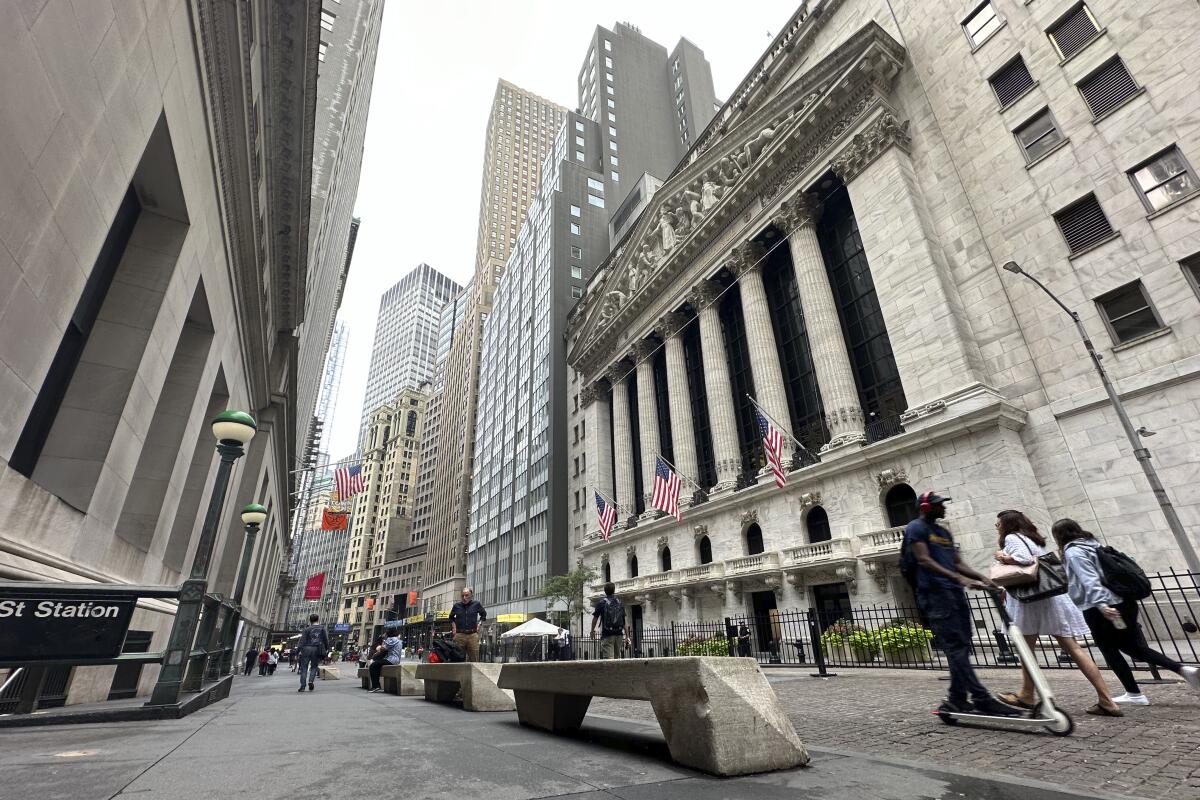Big Tech weakness holds back Wall Street even as most stocks rise

NEW YORK — More drops for Big Tech stocks dragged on Wall Street on Tuesday, overshadowing gains for much of the U.S. stock market.
The Standard & Poor’s 500 slipped 0.5%, even though 2 out of 3 stocks within the index rose. The Dow Jones industrial average rose 203 points, or 0.5%, and the Nasdaq composite sank 1.3%.
PayPal rose 8.6% and helped lead the market’s gainers after it topped analysts’ expectations for profit during the spring. It also raised its forecast for profit for the full year.
JetBlue Airways climbed 12.3% after reporting a profit for the spring; analysts were expecting to see a loss. The airline also outlined ways it hopes to improve on-time performance and attract customers.
But a 0.9% slide for Microsoft nevertheless helped drag the S&P 500 lower as investors waited for its latest profit report, which arrived after trading finished for the day. Microsoft’s stock fell further in after-hours trading.
Most of the other stocks in the group known as the “Magnificent Seven” also fell Tuesday, including a 7% tumble for Nvidia. This handful of large tech stocks drove the S&P 500 to dozens of records this year, in part on investors’ frenzy around artificial intelligence technology. But they ran out of momentum this month amid criticism they had grown too expensive and expectations had run too high.
Last week, investors found profit reports from Tesla and Alphabet underwhelming, which raised concerns that other Magnificent Seven stocks could also fail to impress. Amazon, Apple and Meta Platforms will report their latest profit results in coming days. Their performance carries extra weight on the S&P 500 because they’re among the largest by value.
Other stocks have been rising, cushioning some of Big Tech’s recent softness, including smaller stocks and companies whose profits are closely tied to the strength of the economy. They rallied on hopes that inflation is slowing enough to get the Federal Reserve to soon begin cutting interest rates.
The Russell 2000 index of smaller stocks added 0.3% on Tuesday, stretching its market-leading gain for the month to 9.5%.
Many on Wall Street expect this rotation from major tech stocks to smaller stocks to continue, but more cautious voices are still urging skepticism.
“In our view, the recent rally is likely unsustainable as the fundamental support is lacking,” said Austin Pickle, investment strategy analyst at Wells Fargo Investment Institute, who said that more than 40% of small-cap companies aren’t making any profits, among other challenges.
Also weighing on Wall Street was Merck, which fell 9.8% despite reporting stronger results for the last quarter than expected. It gave a forecast for profit this year that fell short of analysts’ expectations, partly because of costs related to its buyout of Eyebiotech.
Procter & Gamble slid 4.8% after beating forecasts for profit in the latest quarter but falling short on revenue. It was hurt by the effects of shifting foreign exchange rates on its international sales, and it expects that to remain a challenge in its upcoming fiscal year.
All told, the S&P 500 fell 27.10 points to 5,436.44. The Dow added 203.40 points to 40,743.33, and the Nasdaq composite fell 222.78 points to 17,147.42.
No one expects the Fed to cut interest rates this week, when it announces its decision on Wednesday. But the widespread expectation is that it will do so at its next meeting in September.
Expectations for rate cuts have sent yields tumbling in the bond market, and they eased further Tuesday. The yield on the 10-year Treasury fell to 4.14% from 4.17% late Monday and from 4.70% in April.
Yields got a brief bump in the morning after a couple of reports on the economy came in stronger than expected. One showed U.S. employers were advertising slightly more job openings at the end of June than economists expected. That’s a good signal for workers, but too much strength could put upward pressure on inflation.
A second report, meanwhile, said confidence among U.S. consumers is improving by more than economists expected. There, too, the hope is for a “Goldilocks” type of reading that’s neither so hot that it raises fears about reaccelerating inflation nor so cold that it warns of a possible recession.
In stock markets abroad, indexes were mixed across Asia and Europe ahead of decisions by central banks there that could shake things up.
Japan’s Nikkei 225 added 0.1% ahead of a meeting by the Bank of Japan, where the expectation is for an increase in interest rates.
The FTSE 100 in London slipped 0.2% ahead of a decision by the Bank of England that could feature a cut in rates.
Indexes were stronger in continental Europe after a report indicated that economic growth was a touch stronger than expected in the second quarter among the 20 countries that use the euro currency, according to official figures released Tuesday by European Union statistics agency Eurostat.
Choe writes for the Associated Press.
More to Read
Inside the business of entertainment
The Wide Shot brings you news, analysis and insights on everything from streaming wars to production — and what it all means for the future.
You may occasionally receive promotional content from the Los Angeles Times.










